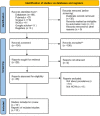Mpox vaccine acceptance among healthcare workers: a systematic review and meta-analysis
- PMID: 38166685
- PMCID: PMC10759337
- DOI: 10.1186/s12889-023-17186-2
Mpox vaccine acceptance among healthcare workers: a systematic review and meta-analysis
Abstract
Introduction: Mpox is a zoonotic viral disease that emerged in May 2022 and has since shown a high prevalence in non-mpox-endemic areas, resulting in an outbreak that caused more than 84,000 cases in 110 countries around the globe. Several vaccines are available to prevent the disease, and multiple studies have been conducted to assess the attitudes of different populations toward receiving the mpox vaccine. This study systematically reviews all the studies conducted on mpox vaccine acceptance/hesitancy among healthcare workers.
Methods: A systematic literature search was conducted through four electronic databases, including PubMed, Scopus, Web of Science, and Google Scholar, up to March 2023. Studies that described mpox vaccine acceptance/hesitancy among healthcare workers were included, and the data were extracted using a uniform extraction sheet. Following the extraction, the meta-analysis included ten studies with 7322 healthcare workers. Three researchers independently assessed the risk of bias in the included study using the Newcastle-Ottawa Scale (NOS).
Results: Ten studies were included in the review. This review indicates that the prevalence of mpox vaccine acceptance was 58.5%, and the prevalence of mpox vaccine hesitancy was 41.5%. There was a higher prevalence of acceptance in countries located in Asian and African areas compared to those in North America and Europe, estimated at 68% and 44.3%, respectively. Among the studies conducted solely among physicians, there was a high prevalence of mpox vaccine acceptance, at 77.1%, compared to 49% in studies that included all healthcare workers.
Conclusion: There is a significant variation in the prevalence of mpox vaccine acceptance among different populations. Further research is needed to identify the factors that contribute to this variation and to develop interventions to increase vaccine acceptance. In addition, it is important to promote research on mpox vaccine acceptance and hesitancy among healthcare workers in countries where data is limited. This research will help policymakers develop effective policies to increase acceptance and reduce the disease burden.
Keywords: Healthcare workers; Meta-Analysis; Mpox; Vaccine; Vaccine acceptance; Vaccine hesitancy.
© 2023. The Author(s).
Conflict of interest statement
The authors declare no competing interests.
Figures






References
-
- Is pandemic finally over? We asked the experts. – Harvard Gazette. https://news.harvard.edu/gazette/story/2022/10/is-pandemic-finally-over-... (Accessed 7 May 2023).
-
- Emergencies: International health regulations and emergency committees. https://www.who.int/news-room/questions-and-answers/item/emergencies-int... (Accessed 7 May 2023).
-
- Sah R, et al. Public health emergency of international concern declared by the World Health Organization for Monkeypox. 2022; 7(1): 51–56 10.1080/23779497.2022.2124185.
Publication types
MeSH terms
Substances
LinkOut - more resources
Full Text Sources
Medical

